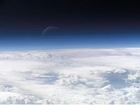Scientists say they have sequenced the genome of the brown kiwi for the first time, revealing that the shy, flightless bird likely lost its ability to see colors after it became nocturnal tens of millions of years ago.
Inspection of the kiwi's DNA also showed greater diversity than in other birds in genes responsible for smell, indicating that New Zealand's national animal can probably detect a wider range of odors — another useful adaptation for a species that prefers living in the dark.
 Full Story
Full Story
The Galapagos Islands, celebrated for their breathtaking biodiversity, could face a major threat from "El Nino," the weather system known to wreak havoc every few years.
The archipelago sustains a vast variety of plant and animal life, and has been recognized as a UNESCO World Heritage Site.
 Full Story
Full Story
Astronauts from Russia, Japan and the United States Thursday docked successfully with the International Space Station after a two-month delay, despite a minor hiccup.
The Soyuz TMA 17M rocket -- carrying cosmonaut Oleg Kononenko, U.S. astronaut Kjell Lindgren and Kimiya Yui of Japan -- blasted off from the Baikonur cosmodrome on schedule after a two-month delay caused by the failure of a Russian rocket during an unmanned resupply mission.
 Full Story
Full Story
Scientists said Wednesday they had created a rice variety with starchier grains that emits less methane, a step towards the twin goals of feeding more people and curbing global warming.
The cultivation of rice, a staple starch for billions of people, is also mankind's major emitter of methane, a potent climate-altering gas.
 Full Story
Full Story
French actress Brigitte Bardot has condemned an Australian plan to cull two million feral cats to stop them harming native animals, a proposal animal rights groups said Wednesday was unlikely to be successful.
Feral cats have been identified as the main culprit behind Australia's high rate of mammal extinction, with more than 10 percent of species wiped out since Europeans settled here two centuries ago.
 Full Story
Full Story
Air pollution levels in China's cities improved in the first six months of this year, environmental campaign group Greenpeace said Wednesday, but remained far worse than global and domestic standards.
Average levels of PM2.5 -- airborne particulates small enough to deeply penetrate the lungs -- declined 16 percent in 189 cities that were ranked both this year and last, Greenpeace said in a press release.
 Full Story
Full Story
Japanese space scientists are on the hunt for a new name for an asteroid that may contain the secret of life, with a public competition beginning Wednesday.
The asteroid, which currently goes by the rather prosaic "1999 JU3" is the intended destination for a Japanese spacecraft, which mission controllers hope will be able to gather samples and bring them back to Earth.
 Full Story
Full Story
The Alaska Volcano Observatory says underground activity is increasing at Cleveland Volcano in the Aleutians Islands.
The observatory recorded an explosion at the volcano at 8:17 a.m. Tuesday, but no ash has been detected. Ash above 20,000 feet would threaten trans-Pacific flights.
 Full Story
Full Story
Native American ancestors reached the New World in a single, initial migration from Siberia at most 23,000 years ago, only later differentiating into today's distinct groups, DNA research revealed Tuesday.
Most scientists agree the Americas were peopled by forefathers who crossed the Bering land and ice bridge which connected modern-day Russia and Alaska in Earth's last glacial period.
 Full Story
Full Story
The explosion last month of SpaceX's Falcon 9 rocket was caused by a failed support piece, or strut, that allowed a helium bottle to burst free inside the rocket's liquid oxygen tank, CEO Elon Musk said Monday.
"One of those struts broke free during flight," Musk told reporters on a conference call to discuss the June 28 blast on what was supposed to be a routine cargo mission to the International Space Station.
 Full Story
Full Story



